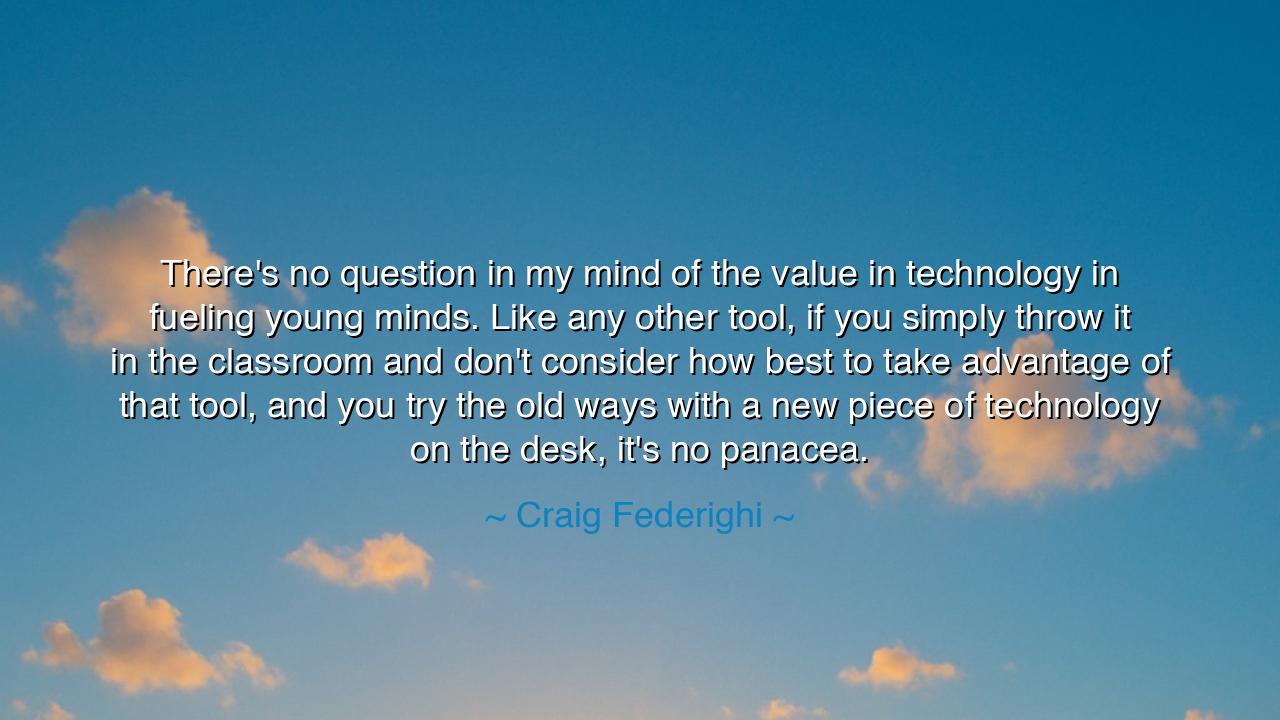
There's no question in my mind of the value in technology in
There's no question in my mind of the value in technology in fueling young minds. Like any other tool, if you simply throw it in the classroom and don't consider how best to take advantage of that tool, and you try the old ways with a new piece of technology on the desk, it's no panacea.






Craig Federighi, a steward of the digital age, speaks with wisdom when he declares: “There’s no question in my mind of the value in technology in fueling young minds. Like any other tool, if you simply throw it in the classroom and don’t consider how best to take advantage of that tool, and you try the old ways with a new piece of technology on the desk, it’s no panacea.” His words are not the idle musings of a technologist but the tempered counsel of one who knows that progress without wisdom is like fire without a hearth—brilliant, but dangerous.
For what is technology, if not a tool forged by human hands to extend the reach of the mind? It is like the hammer, which can build a temple or destroy a wall, depending on how it is wielded. Federighi speaks of the classroom, the sacred chamber where young souls are shaped. He reminds us that placing a device before a child does not in itself awaken genius, just as handing a scroll to an illiterate man does not make him a sage. The tool itself has power, but it must be joined with vision, with teaching, with purpose, if it is to truly fuel young minds.
Consider the story of the Library of Alexandria, a treasury of scrolls and wisdom gathered from across the known world. The rulers who built it believed that the possession of knowledge was itself enough to make their city the beacon of civilization. Yet the library, vast and glorious, did not by itself make all who entered wise. Many who passed through its halls remained unchanged, for wisdom is not in the possession of knowledge, but in its interpretation, its application, its living spirit. In the same way, a computer or tablet set upon a desk is not wisdom. It is only when a teacher guides, when a mind engages, when the tool is bent toward noble ends, that learning is born.
Federighi warns us that technology is no panacea. The ancients would have called it no cure-all potion, no philosopher’s stone. How many times has mankind believed that a single invention would erase all hardship? Yet the plow did not end hunger, nor did the press end ignorance, nor did the engine end poverty. Each brought advancement, yes, but only when joined with discipline, justice, and wisdom did they bear their greatest fruits. So too in our age: the tablet, the laptop, the Internet are mighty vessels, but empty if not filled with the waters of true teaching.
And yet, we must not ignore the flame of potential within them. To fuel young minds with technology is to give them the tools to see further, to build faster, to dream wider than any generation before. A child with a device in hand can speak across oceans, learn the stars above, create music without instruments, and explore worlds both real and imagined. It is a gift of fire, like that which Prometheus stole from the gods. But as the ancients knew, fire can warm or it can burn. It is not the fire itself that saves, but the wisdom with which it is tended.
The lesson then is clear: do not worship technology as a god, nor cast it aside as an enemy. Embrace it as a companion on the path of learning, but guide it with intention. Parents, teachers, leaders—do not simply place tools in the hands of the young and walk away. Shape the way they use them. Teach them to ask questions, to seek truth, to create and not merely consume. In this way, the tool becomes more than metal and code; it becomes a bridge to greatness.
Practical action must follow. When you give a child a device, give also instruction, guidance, and purpose. Let technology be woven into lessons that encourage creativity, problem-solving, and exploration. Do not fall back on the old ways with new tools, for that is like pouring old wine into new skins, and both will fail. Instead, craft new methods worthy of the age: collaborative projects, digital storytelling, exploration guided by curiosity rather than rote. Only then will the fire of invention truly light the hearts of the young.
So hear this teaching: technology is a tool, not a savior. Its value lies not in its presence, but in its use. Federighi’s words remind us that we, the guides of the next generation, must bear the responsibility to shape how it is wielded. Do this with wisdom, and you will raise a generation not enslaved by their tools, but empowered by them, ready to build a future brighter than any we can yet imagine.






AAdministratorAdministrator
Welcome, honored guests. Please leave a comment, we will respond soon